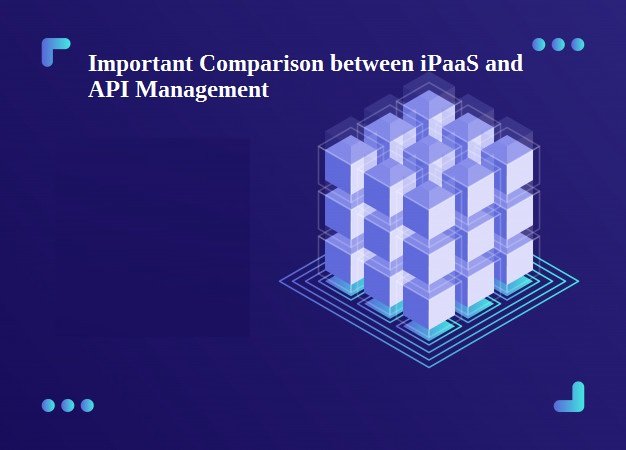Important Comparison between iPaaS and API Management

- Introduction
This article will provide informative content that will help you to choose a better alternative between iPaaS (integration platform as a service) and API management. Tech-savvy can gain essential information and choose a suitable option for an enterprise or organization.
Organizations using application programming management interface solutions can understand the importance of them. Those that are using iPaaS (integration platform as a service) for the integration of apps and data do not want to rely on API solutions. But the question arises, “What are the differences between them?”
Nevertheless, API management and iPaaS are both essential for companies as they perform peculiar functions for the accomplishment of different types of tasks. Hence, they both are important for any organization.
- How APIs and iPaaS affect Each Other
Understanding about APIs and iPaaS helps to know their effect on each other. Let’s start the discussion and gain insight into iPaaS and APIs.
iPaaS allows systems to share data and allows the exchange of data between IoT devices, cloud apps, and different technologies. While interchanging data between CRM systems and ERP systems, iPaaS reveals APIs for each system.
The development of APIs varies with their management. Poor management of APIs can lead to data breach and malfunction of systems, i.e., it helps in building APIs. The efficiency of operational functions is also affected.
Let’s take an analogy to understand API management. A farmer is planning to plant an apple orchard. What will happen if he fails to manage plants (APIs)? Either thief will steal crops or pests will damage crops. No manufacturer would like to deal with owners who sell low-quality crops. The analogy clearly shows the importance of management.
What makes API management solutions different from iPaaS Solutions?
The above-given analogy has revealed some facts. If a tech-savvy is using iPaaS to create APIs and wants to utilize them for better profit, then, the management of APIs is a must.
It is important to understand the ability that makes API management solutions different from iPaaS solutions; in this way, developers can control APIs.
- The ability of Application Programming Interface Management Solutions
- Control: API management solutions featuring load balance and rate limit smoothen the implementation of API and processes that are used for implementation. Requests made for APIs can be limited with the help of rate-limiting in a fixed time. Now, understand the role of load balancing. Leveraging gateways is possible for an API and this is possible through load balancing feature. The inflow of API requests can be easily distributed through gateways. Therefore, both features are important in their way; one is preventing time lag while another is preventing the failure of processes during implementation.
- Gateway: API gateways target users to access and regulate APIs. They are protecting from a data breach. Experts can use them for innovation and improvement of processes. Hence, developers and partners can easily indulge in creating processes for businesses.
- Robust Portal: Developer portal provides resources that tech-savvy or developers need for the development of applications. The resources may include API documentation, use cases and different types of materials that help tech-savvy to understand API, i.e., their ability and control. Hence, developer portals create a better possibility of innovation.
- Complete Maintenance: Application programming interface solutions provide a suite of tools and applications from planning to maintaining. A single system (that is used for the maintenance of APIs) controls processes and boosts productivity.
- Reporting: Application programming interface solutions provide valuable information that helps experts to analyze and act for better opportunities. API analytics will find and solve problems before it becomes complicated. The real-time analysis of API measures the complete performance of API, i.e., latest trends, security threats, etc. Therefore, API analytics is an integral part of the strategy.
But what is the role of iPaaS? iPaaS creates a powerful base for modern and cloud architecture while an API management solution is used to create fledged ecosystems where experts belonging from different backgrounds can build apps.
Leveraging iPaaS that possess features of API for similar platforms is one of the best solutions for development-related works. If we talk in analogy terms, then, you will have to focus on three factors. In the first step, you have to link apps and data. In the next step, you will have to build APIs. In the last step, you will have to work on management-related works through a unified structure.

Expert Installation: Tips for Choosing Air Conditioning in Brisbane

How to Maintain a Rotary Vane Air Compressor

Pet Hospital Logo Design Samples

Top 5 Tips for Starting Online Makeup Store in Pakistan

Best Apps to Have on your Phone - Both iOS and Android

Top 5 Tips for Starting Online Makeup Store in Pakistan


